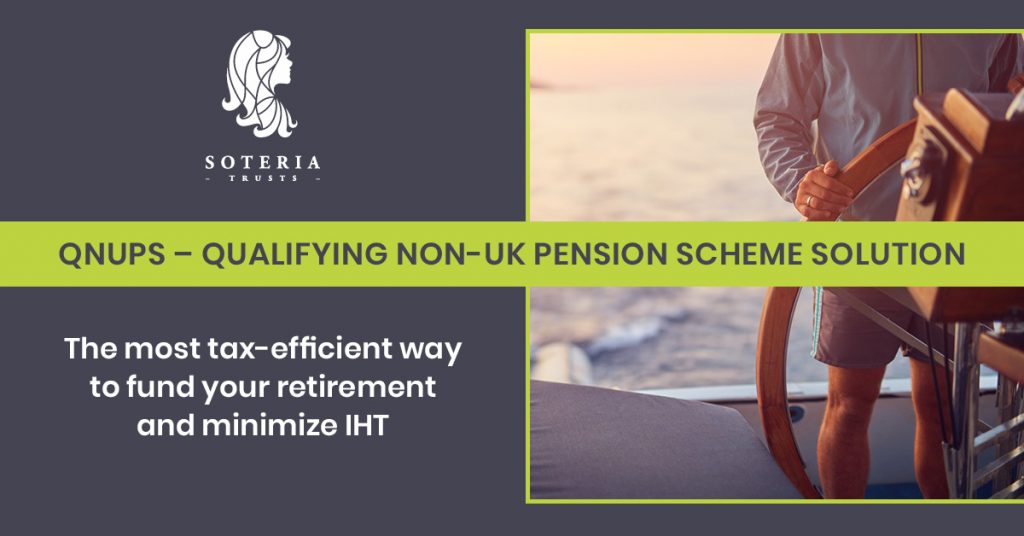British Expats: Avoid These Pension Mistakes

Please be advised that the information in this article regarding QNUPS and IHT is no longer accurate due to the recent changes announced in the UK Budget. Starting in April 2025, the regulations will have significant implications that may affect your understanding of these topics. We encourage you to stay informed and consult with a Soteria Trusts expert to navigate these changes effectively.
Many British expats seek guidance when planning a retirement strategy. They do this to avoid making costly UK pension mistakes that can seriously jeopardise their retirement fund. The planning becomes even more complicated when a British expat doesn’t intend to return to the UK, or if their earrings are exceptionally high. These different scenarios require different approaches when planning.
What happens to my UK pension if I emigrate?
Your UK state pension and personal/workplace pension credits will remain as they were when you move abroad. While there will be no more contributions, the funds in your workplace and personal pensions have a chance to grow in line with the underlying assets. Your UK state pension value will remain the same from the moment you stop the contributions. Remember, to qualify for the UK state pension, you need to have made at least ten years of National Insurance Contributions (NIC).
Can I claim my UK pension if I live abroad?
The simple answer is yes but there are rules regarding drawing your state pension when you live abroad. British expats retiring abroad can access their pensions from another country. However, if you live in a specific country (outside of the EU, EEA, or Switzerland) the annual pension amount might be fixed and not benefit from any annual inflationary increases (the triple-lock guarantee). In addition, you will likely face currency exchange and transfer fees to receive your pension in your country of residence. One more thing to keep in mind is that you will pay UK income tax on your pension income each year if you live abroad and are deemed UK-domiciled for tax purposes.
How are UK pensions taxed?
Pensions provide you with a retirement income; therefore, pension benefits are generally treated as income and are subject to the standard income tax bands and allowances. The allowances for the tax year 2021/2022 can be seen below.
| Income | Rate | Tax |
| Up to £12,570 | Personal Allowance | 0% |
| £12,571-£50,270 | Basic Rate | 20% |
| £50,271-£150,000 | Higher Rate | 40% |
| Over £150,000 | Additional Rate | 45% |
What happens to my UK pensions if I die abroad?
Defined contribution and defined benefit pensions provide different benefits on death. What gets paid out is dependent on whether you have left your pension in the UK or transferred it to an overseas scheme in another country. Most importantly, make sure you nominate the beneficiary of your pension and let your pension provider know. There is also a general rule on the taxation of an inherited pension. While there is no inheritance tax on pensions, in some extreme cases, the beneficiaries will have to pay income tax on the private pension they inherit.
British Expats: These are the pension mistakes to avoid
You may be a little detached from the latest pension news if you have been living outside the UK for some time. There may be added complexity in international taxation, managing assets back at home and those acquired in your new country of residence. Below, we will go over typical pension mistakes British expats (but not only) make when they reach retirement age.
- Saving too much in your private or workplace pension schemes
Have you heard about the pensions annual and lifetime limits? Quite often, British expats who have spent a couple of years working abroad might have been able to save more in their private pensions. Chancellor Rishi Sunak froze the pensions lifetime allowance for five years in his 2021 March Budget. It means that if your pension fund goes beyond the £1,073,100 lifetime allowance, you may end up paying:
- 55% tax if you chose to take it as a lump sum, or
- 25% tax if you decided to take it as cash or pension payments
The same goes for the annual pension allowances; however, you pay additional tax on contributions exceeding £40,000 per annum.
- Cashing in an entire pension as a lump sum
When they reach retirement age, which is usually 55, some expats cash out all of their available workplace or private defined contribution pension funds to use in one go in the locations they currently live. However, only 25% of your entire pension fund can be withdrawn tax-free. The remaining 75% is then taxed as income at your marginal rate of tax, based on your total taxable income for the tax year, which can leave you with a hefty tax bill and reduce your overall retirement fund in one go.
- Transferring the pension without proper advice
A popular way among British expats is to transfer their UK pension schemes to the new country of their residence. A popular mechanism used for pension funds transfer is QROPS (qualifying recognised overseas pension scheme). However, residency consideration is the key here, and QROPS legislation is very complicated. QROPS are intended for people who do not plan to retire in the UK, and HMRC has the right to tax you an extra tax for withdrawal dates within ten years of making the transfer.
Moreover, since 2007, only EU residents can transfer UK pensions into an EU/EEA-based QROPS tax-free. Unless you reside in the same jurisdiction as the QROPS, moving to a scheme outside the EU will trigger a 25% UK Overseas Transfer Charge of the fund’s total value. Professional advice on the matter should be sought when considering international pension transfers.
- Not being aware of IHT
Taxation mechanisms in the UK ambush the UK taxpayers in every possible way. First, income tax, stamp duty land tax, capital gains tax, then you pay an income tax on pensions again, and finally when you die, your loved ones have to pay another tax on all of your wealth that’s leftover £325,000 for singles and £650,000 for married persons. A lot of British expats living outside of the UK think that they are not subject to UK inheritance tax, even on assets acquired outside of the UK. This thinking can leave a huge tax burden to your beneficiaries if it’s not carefully planned for.
What can British expats do to protect their retirement income from taxes?
British expats who choose to retire abroad in countries other than the EU, EAA and Switzerland must pay special attention to their UK pensions status. One way to offset all of the four typical expat pension mistakes is to open a QNUPS – Qualifying Non-UK Pension Scheme.
This mechanism is a perfect solution for both UK residents and non-UK residents with UK assets, especially those that change their country of residence often. QNUPS is a truly international retirement plan which you can access and contribute to no matter where you currently reside.
QNUPS: No lifetime pension allowance, no IHT on all assets, including property
Moreover, QNUPS are not subject to the Lifetime Allowance mentioned above, so you can grow your pension pot as big as you want, and all of the assets in that pot (including property) can be passed on to your family free from Inheritance Tax.
QNUPS: No income tax on retirement income (subject to residency and QNUPS location)
Moreover, you may be able to draw your retirement income from QNUPS, income tax-free. This is subject to the QNUPS location and your residency status. This is because QNUPS can be open in very favourable tax jurisdictions, which have double taxation agreements with the United Kingdom, or special tax arrangements for pension income taxation for non-residents, such as Guernsey.
QNUPS: Highly regulated
Rules around QNUPS are very strict, so of course, you need proper guidance when considering transferring your assets to this retirement vehicle. That’s what Soteria Trusts specialise in and our consultants will explain to you all the intricacies of the solution based on your specific circumstances. Get in touch for more information on your retirement needs, and see if a QNUPS is a right choice for you.
